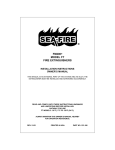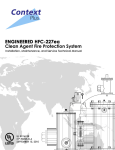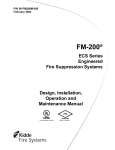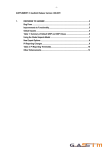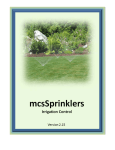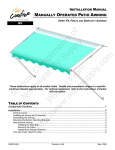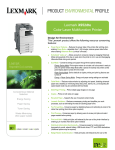Download Sea-Fire FM200 FD Owner`s manual
Transcript
FM200® MODEL FT FIRE EXTINGUISHERS INSTALLATION INSTRUCTIONS OWNER’S MANUAL THIS MANUAL IS AN INTEGRAL PART OF THE SYSTEM AND AS SUCH, THE EXTINGUISHER MUST BE INSTALLED AND MAINTAINED ACCORDINGLY. READ AND COMPLY WITH THESE INSTRUCTIONS, WARNINGS AND LIMITATIONS BEFORE INSTALLING. SUITABLE FOR USE FT MODELS: 32°F – 130°F ( 0°C – 54°C) ALWAYS MAINTAIN THIS OWNER’S MANUAL NEARBY FOR OPERATOR REFERENCE. APPROVALS FACTORY MUTUAL - FM # 3022058 U.S. COAST GUARD - U.S.C.G. # 162.029/241 REV. A PRINTED IN USA PART NO. 123-186 WARNING CONCENTRATED AGENT AND BY-PRODUCT OF APPLICATION TO FIRE ARE TOXIC. AVOID BREATHING OF FUMES OR PROLONGED EXPOSURE. ACCIDENTAL DISCHARGE MAY OCCUR DURING HANDLING OR INSTALLATION OF THIS DEVICE, READ AND COMPLY WITH INSTRUCTIONS, WARNINGS, AND LIMITATIONS CONTAINED IN THIS MANUAL. DO NOT LIFT, CARRY, OR HANDLE BY VALVE. DO NOT DROP. KEEP AWAY FROM HEAT. KEEP AWAY FROM CHILDREN. APPLICATION FM-200® (CF3CHFCF3), the extinguishing agent, used in all Sea-Fire “FT’’ series fire extinguishers, is a suitable EPA accepted alternate replacement for Halon. FM-200® is electrically nonconductive and residue free extinguishing agent that requires no cleanup. These features and the versatility of design make the “FT’’ series fire extinguisher ideal for a broad range of applications. The systems are ideal for small volumes, 150 cubic feet or less, that are difficult to access. These applications would include marine, recreational vehicles, commercial and industrial use where flammable liquids are likely source of fire. Application Examples: • Engine Compartments (maximum 150 cubic feet) • Bow Thrusters • Small Generator Set Enclosures • Consoles • Electrical Enclosures • Flammable Liquid Storage Areas • Pump Enclosures • Alternative Fuel Storage Areas Sea-Fire “FT” extinguishers are designed to induce a minimum atmospheric concentration of 10.0% within the protected compartment.* The specification table in this manual lists the minimum and maximum approved compartment volume (size) allowable for each model. Volume can be determined by multiplying the compartment’s length x width x height which equals the volume in cubic feet or meters (LxWxH=V). Exception: If the boat manufacturer has placed a permanently affixed label in the compartment specifying the gross volume less the volume of permanently installed tankage, then this volume may be used to determine the proper size extinguisher. Check specification table for proper application before making installation. *Reference: NFPA-2001 National Fire Protection Assoc. Boston, MA and UL 2166 Underwriters laboratories SEA-FIRE “FT” SERIES AUTOMATIC FIRE SUPPRESSION SYSTEMS FT — STINGER SPECIFICATION TABLE MODEL AUTO FT-25 FT-50 FT-75 FT-100 FT-125 FT-150 AREA OF PROTECTION CU.FT. CU.M. AREA AREA 25 50 75 100 125 150 0.7 1.4 2.1 2.8 3.5 4.2 CU. FT. = Cubic Feet CU.M. = Cubic Meters FM-200 @ 240 PSI LBS. KG 1.25 2.50 3.75 5.00 6.25 7.50 0.56 1.13 1.70 2.26 2.83 3.40 DIAMETER X HEIGHT INCH MM 3.0 X 11.2 76 X 285 3.1 X 13.5 78 X 342 3.1 X 16.5 78 X 419 3.5 X 17.5 89 X 444 4.1 X 17.0 104 X 432 5.2 X 19.0 132 X 482 FT. = Feet LBS. = Pounds TUBE PART # / LENGTH PART# FT. MM 130-121 130-121 130-121 130-122 130-122 130-122 10 10 10 15 15 15 3000 3000 3000 4500 4500 4500 KG = Kilograms MM = Millimeters CAUTION: NEVER INSTALL A UNIT WITH A VOLUME RATING LESS THAN THE GROSS VOLUME OF THE COMPARTMENT TO BE PROTECTED. DO NOT DEDUCT FOR ENGINES, REMOVABLE TANKS OR OTHER EQUIPMENT. 2 REMINDER: Sea-Fire systems shall be considered as supplementary to the number of portable fire extinguishers required on-board and are designed and intended for enclosed unoccupied compartment installations that are not subject to direct weather or water. SYSTEM OPERATIONS Sea-Fire units described in this manual are automatically actuated by a heat actuated tube. Discharge will occur as a result of direct flame impingement. The Sea-Fire FT system uses the supplied length of temperature sensitive tubing as both detection and delivery system. The tubing should be routed close to the hazard, where fire is likely to occur, but away from heat sources that could accidentally cause it to operate. Upon flame impingement, the tubing will rupture, and the extinguishing agent will discharge through the rupture point. No separate discharge nozzle is needed. CAUTION: IN CASE OF EXTINGUISHER DISCHARGE, DO NOT RUSH TO OPEN THE PROTECTED COMPARTMENT. LET THE EXTINGUISHING AGENT WORK FOR SEVERAL MINUTES. HAVE A PORTABLE EXTINGUISHER AVAILABLE AND USE CARE WHEN OPENING THE COMPARTMENT. AVOID BREATHING FIRE RELATED FUMES OR VAPOR. NOTE: It is important to retain the designed vapor concentration within the compartment to insure complete fire outage. Upon discharge, all powered ventilation (blowers) must be shut down. PRESSURE SWITCH Sea-Fire “FT” series extinguishers are equipped with a factory installed pressure switch which is intended for cylinder pressure supervision and may also be used to control other electrical functions (engine shutdown, air exchange equipment, electric supply, etc.) When using the pressure switch as an electrical disconnect for any equipment shutdown function, a means of overriding (bypassing, shunting) the pressure switch must be provided in order to return the affected equipment to an operational mode after extinguisher discharge has occurred. The pressure switch is a single pole single throw (SPST) type that is normally closed (NC) with the system in the charged condition. Discharge or loss of system pressure will release the contacts to an open state thereby cutting off any electrical current flow. NEVER USE PRESSURE SWITCH FOR ELECTRICAL LOADS OVER RATED CAPACITY. SWITCH SPECIFICATIONS 4.0 AMPS AT 12 VDC 2.0 AMPS AT 28 VDC For applications requiring larger load capacities, see OPTIONAL EQUIPMENT section IN THIS manual or contact factory. DIESEL ENGINES Continued operation of diesel engine(s) and or powered ventilation units will deplete the extinguishing agent and may cause a fire re-flash. Diesel engine(s) must be automatically shutdown upon extinguisher discharge. Note: Power ventilation (blowers) that exceeds one air change per minute within the protected compartment must be automatically shutdown upon extinguisher discharge.* *ABYC requirement - Standard A-4 GASOLINE ENGINES WARNING: GASOLINE ENGINES AND FANS SHOULD BE AUTOMATICALLY OR MANUALLY SHUT DOWN AT TIME OF DISCHARGE. Shutdown may be accomplished by interruption of the electrical circuit between the ignition switch and the engine coils. NOTE: Sea-Fire optional engine interrupt systems will automatically shut down engines and powered ventilation upon discharge of the fire SUPPRESSION system. They are available in 12 and 24-volt models with 3, 5 or 8 control circuits, refer to OPTIONAL EQUIPMENT section in this manual. 3 • • • • • • • • OTHER APPLICATIONS Engine Compartments (maximum 150 cubic feet) Bow Thrusters Small Generator Set Enclosures Consoles Electrical Enclosures Flammable Liquid Storage Areas Pump Enclosures Alternative Fuel Storage Areas In case of a fire and system discharged, the electrical supply to the motor must be disconnected. Failure to do so may result in re-ignition after the FM-200® concentration depletes. Disconnect may be accomplished by using a shutdown system. See OPTIONAL EQUIPMENT. INSTALLATION READ ENTIRE INSTRUCTION INSTALLATION. MANUAL AND CYLINDER NAMEPLATE PRIOR TO These installation instructions are intended to cover most normal installations. Additional technical or application information can be obtained by contacting Sea-Fire Marine Baltimore, Maryland, USA Tel: 410-687-5500 or Sea-Fire Europe LTD Southampton, England Tel: (0) 1329 847225 Website: www.sea-fire.com CAUTION: 1. DO NOT INSTALL IN AN AREA DESIGNATED FOR OCCUPANCY. 2. ACCIDENTAL DISCHARGE MAY CAUSE SERIOUS INJURY. 3. HANDLE THE CYLINDER WITH EXTREME CARE. 4. WEAR EYE PROTECTION. 5. DO NOT LIFT OR CARRY CYLINDER BY THE MANIFOLD OR ACTUATOR COMPONENTS. 6. DO NOT ATTEMPT TO LOOSEN OR REMOVE ANY EXTINGUISHER COMPONENT. 7. DO NOT ATTACH SEA-FIRE EXTINGUISHER ON UNDERSIDE OF COVER OR COMPARTMENT HATCH THAT COULD BE THROWN CLEAR DUE TO POSSIBLE EXPLOSION. 8. DO NOT MOUNT WHERE AN ACCUMULATION OF STANDING WATER COULD BLOCK SENSOR OR CAUSE CORROSION. 9. EXTINGUISHER TO BE MOUNTED IN THE VERTICAL POSITION ONLY. 10. DO NOT USE FOR PRIMARY ENGINE COMPARTMENT PROTECTION. EXTINGUISHER INSTALLATION: Step 1 Carefully remove extinguisher from carton and visually check for damage in shipment. Step 2 To ensure that the extinguisher is operational, both the weight and pressure indicator must conform with the extinguisher specification as shown on the nameplate. Weigh extinguisher (less bracket) on an accurate calibrated scale before installing. Record date and weight on tag provided for this purpose. Step 3 Choose a suitable location inside or outside the protected area where accidental damage is unlikely to occur. Step 4 Ensure mounting surface is durable (Prefer no less than __ inch. Mounting on fiberglass surfaces: A backing washer (flat) or plate should be utilized if the thickness is less than inch. Step 5 Using the bracket as a template, drill (4) ____” diameter holes. Mount the bracket using no less than Grade 5 corrosive resistant ____” fasteners. (See Figure 5) Step 6 Install the extinguisher into the bracket and latch clamp. Step 7 If required to route detection tube through a compartment wall, drill hole 25/64" diameter, and utilize supplied grommet to protect tube from wear. (See Figure 6) 4 Figure 5 Step 8 Secure the detection tubing to the bulkhead by using the clips and screws supplied. Nylon wire ties may be used in lieu of the clips and screws. Note: Do not exceed a bend radius of 6 inches during the routing of the tube. WARNING WHEN INSTALLING THE DETECTION TUBING, DO NOT KINK THE TUBING AND DO NOT EXCEED THE MINIMUM BEND RADIUS. FAILURE TO FOLLOW THESE DIRECTIONS CAN RESULT IN A SYSTEM FAILURE. (See Figure 6) Step 9 Ensure the spring nut fitting is on tube, and attach by carefully working the tube completely down on the nipple fitting on cylinder assembly/ (Note: Do not kink tubing, if kink occurs, remove effected area with razor. Step 10 Tighten fitting and tube to cylinder using 1/2" (12mm) wrench. Preferred torque value is 3 - 4-1/2 inch pounds of force. Overtightening may cause tube to rupture. Step 11 Activate system - Using a straight screwdriver, “open valve VERY SLOWLY” counter clockwise, 1/4 of a turn, to allow detection tube to fill with nitrogen. Note: Label on valve indicates valve and system status. (ACTIVATE) Step 12 After tubing is routed, and charged, verify there are no apparent damage, and that the fitting ends of tubing are leak free. Note: If a leak is detected, close valve, and re-tighten fittings. If leak persists, remove affected zone and re-install. Ensure valve is open (Activate) at completion of installation. 5 Figure 6 THE FT EXTINGUISHER INSTALLATION IS COMPLETE. INDICATOR LIGHT OPERATION All Sea-Fire extinguishers approved for marine applications are packaged with an indicator light and escutcheon. ‘‘The U.S. Coast Guard approval requires an indicator light if this unit is installed for the protection of a boat’s engine compartment.” The indicator light (unless replaced by another Sea-Fire method) must be installed for system supervision and operator awareness. When properly installed, activation of electrical power to the system will illuminate the light indicating normal charged condition. System discharge or loss of pressure will immediately extinguish the indicator light. In the event that the indicator light is not lit when power is applied, check for the following conditions: 1. Check pressure indicator gauge for proper range. 2. Check fuse and indicator light and replace if defective (lamp replacements available from factory). 3. Check for loose electrical connections. 4. Remove and weigh system cylinder as described in MAINTENANCE Section of the manual. INDICATOR LIGHT INSTALLATION Select a location at the helm on or near the console that is in full view of the helmsman, the location selected must have access for electrical wiring. Remove the adhesive protective cover from back of indicator escutcheon and attach. For proper adhesion, surface must be clean and dry and temperature must be above 50°F (10°C). Use the preformed escutcheon hole as a template and carefully drill a 5/16" (8mm) hole. Insert indicator light wire through hole and seat light assembly by pressing clip into position. Indicator light is now ready for wiring (see Figure 3). CAUTION: PRIOR TO WIRING INDICATOR LIGHT, TURN OFF ELECTRICAL POWER BY SWITCHING OFF CIRCUIT BREAKER, REMOVING FUSE OR DISCONNECTING POSITIVE BATTERY TERMINAL. FAILURE TO DISCONNECT ELECTRICAL POWER 6 Figure 9 INDICATOR LIGHT ELECTRICAL SWITCH STARTER IGNITION IGNITION SWITCH IN-LINE FUSE BATTERY GROUND Figure 3 WHILE MAKING ELECTRICAL CONNECTION CAN RESULT IN INJURY FROM FIRE OR ELECTRICAL BURNS. The indicator light is rated for 12 VDC (contact factory for other voltages). Wire in accordance with the American Boating and Yacht Council standard E-9 “Direct current Electrical System on Boats, copies of which may be obtained from ABYC, Edgewater, MD, USA 21037, 410-956-1050. Supplies, which are not included with your Sea-Fire system, should be at hand before indicator light installation, are as follows: 1. Five (5) ampere in-line fuse and holder 2. Sufficient length of insulated 16 AWG stranded wire 3. Crimp on wire connectors 4. Crimp pliers, hand tools Attach one wire lead from the in-line fuse to the ignition position on the starter switch. Connect other lead from the in-line fuse to the indicator light. Connect remaining indicator lead to one of the Sea-Fire cylinder pressure switch connector wires. Connect the remaining cylinder pressure switch lead to common ground, which may be the negative battery buss at the control panel, or directly to the engine block (see Figure 3). CAUTION: Electrical systems vary from vessel to vessel and these directions may not be applicable for your installation. Should you have any doubts of safely accomplishing this installation, contact a qualified marine electrician or SEA-FIRE MARINE USA at 410-687-5500 for technical assistance. SYSTEM MAINTENANCE WARNING: DO NOT ATTEMPT TO DISASSEMBLE ANY PART OR COMPONENT OF THE EXTINGUISHER. THIS UNIT IS PRESSURIZED AND SERIOUS INJURY COULD RESULT. CONTACT THE FACTORY OR AN AUTHORIZED DEALER FOR SERVICE. 7 Before operating the protected vessel, visually inspect pressure gauge for compliance and ensure the supervisory (indicator) light is lit. If gauge reads low in pressure, and or the indicator light is extinguished, remove, and replace the system immediately. Never paint or obstruct the detection tube, as this will adversely affect its operating characteristic. FT models are non-refillable. See nameplate on cylinder for instructions and OUT OF WARRANTY REPLACEMENTS section of this manual. REMINDER: • FREQUENTLY CHECK GAUGE FOR PROPER PRESSURE LIMITATIONS Sea-Fire FT model series FM-200® automatic fire extinguishers are designed and tested to extinguish Class C (electrical) and Class B (flammable liquid) fires in enclosed compartments only. Any open doors or hatches will allow discharging agent to escape and will seriously affect the ability of the agent to extinguish the fire. Only one extinguisher may be used to protect a compartment. If more than one extinguisher is used to achieve the required amount of agent concentration, there is no guarantee that several extinguishers will actuate simultaneously as each extinguisher operates independently. Several extinguishers may be used only if each independent extinguisher is capable of protecting the entire volume of the compartment. OPTIONAL EQUIPMENT Panel mounted visual/audible discharge alarm unit. Panel mounted system status indicator with override switch for engine(s) restart. For use with the ESRS engine shutdown system as a replacement or add-on second helm station. ESRS III, V, VIII Engine and powered ventilation (blower) shutdown system. Includes one circuit control unit and one panel mounted ESRS-2 visual/audible system status indicator with override switch for engine restart. Available with 3,5, or 8 control circuits in 12 or 24 VDC models. ESRS-WT III, V, VIII Same as ESRS-MARK shutdown system, but also includes a factoryinstalled nominal 20-second release timer on the engines control circuits. For use in diesel engines that shutdown through activation of a momentary device (i.e., push button, lever, etc.). SFAB12 (24) Discharge alarm bell 6" round 12 or 24 VDC models. ESEH-10 10 foot (3.05 meter) extender harness for use with ESRS systems. ESEH-30 30 foot (9.15 meter) extender harness for use with ESRS systems. SDDA I ESRS-2 Contact Sea-Fire or an authorized Sea-Fire dealer for details. THREE (3) YEAR FT SERIES LIMITED WARRANTY We warranty to the original retail purchaser all SEA-FIRE extinguishers for a period of three (3) years after retail purchase against defective material and faulty workmanship, any system found to be defective during the warranty period will be repaired if possible, or replaced free of charge if classified non-refillable (according to product label) upon the prepaid return of the defective system. Proof of purchase required, otherwise date of manufacturer on extinguisher label will apply. This warranty gives you specific legal rights which may vary by state or country. THE FOREGOING WARRANTY IS MADE IN LIEU OF ALL OTHER WARRANTIES WITH RESPECT TO THE SYSTEM INCLUDING ANY IMPLIED WARRANTY OF MERCHANTABILITY OR FITNESS FOR A PARTICULAR PURPOSE. NO PERSON IS AUTHORIZED TO GIVE ANY OTHER WARRANTY, OR TO ASSUME FOR SEA-FIRE MARINE ANY OTHER LIABILITY IN CONNECTION WITH THE SALE OR INSTALLATION OF ITS PRODUCTS. REPLACEMENT OF THE SYSTEM WILL BE THE SOLE REMEDY WITH RESPECT TO ANY LOSS OR DAMAGE TO PROPERTY. BUYER IS NOT RELYING ON SELLER’S JUDGMENT REGARDING BUYER’S PARTICULAR REQUIREMENTS AND BUYER HAS HAD AN OPPORTUNITY TO INSPECT THE PRODUCT TO BUYER’S SATISFACTION. 8 CONDITIONS All Sea-Fire products are tested after manufacture and shipped in perfect working order. Damage noted upon receipt of shipment should be addressed as a shipping claim, the filing of which is the sole responsibility of the consignee for which the total compensatory award will be limited to that appropriated by the carrier. Insured freight costs are the responsibility of the consignee. Missing component parts and damage noted upon installation are typically the result of mishandling during the installation process and will not qualify for warranty coverage. Incidents of accidental discharge are not indicative of product failure — heed product warnings to avoid injury and/or associated costs. No returns will be processed without proper return authorization. OUT OF WARRANTY REPLACEMENTS/RECHARGES SEA-FIRE “FT” Model Series cylinders comply with DOT Specification 39. These cylinders are not refillable. The discharged cylinder will be replaced with comparable Sea-Fire extinguisher upon prepaid return of the discharged system for one-half of the current suggested list price. RETURN TO: UNITED STATES EUROPE SEA-FIRE MARINE SEA-FIRE EUROPE LTD Division of Metalcraft Inc. Unit 7. io Centre. Stephenson Road 9331-A Philadelphia Road Fareham, Hampshire Baltimore, Maryland 21237 USA PO15 5RU, United Kingdom Website: www.sea-fire.com 1. 2. 3. 4. 5. 6. 7. 8. 9. 10. 11. EQUIPMENT LIST FOR INSTALLATION Drill motor. Drill bit - 25/64" (.390") for rubber grommet. Drill bit -1/8" (.125") for tie down clips. Drill bit - 1/4" (.250") for bracket mounting. Drill bit - 5/16" (.312") for light kit. Screw driver - Standard (flat) for opening valve. Screw driver - Phillips (cross point) for tie down clip screws. Wire - 16 AWG, for wiring light kit. Fuse - 5 amp inline, for light kit. Torque wrench - 0-100 inch lbs. Wrench - 12mm MODEL FT PARTS LIST 1. Cylinder Assembly - Reference Specification Table for application. Model # Part # FT-25 130-058 FT-50 130-059 FT-75 130-060 FT-100 130-061 FT-125 130-062 FT-150 130-063 2. Tube Kit - Reference Specification Table for application. 10' Tube kit part # 130-121 15' Tube kit part # 130-122 3. Tube Parts Kit - FT Kit part # 130-114 4. Light Kit - 12 Standard Light Kit part # 130-117 5. Bracket Assembly Model # Bracket Part # FT-25 122-010 FT-50 122-010 FT-75 122-010 FT-100 130-011 FT-125 130-012 FT-150 130-013 9 ALL FT (STINGER) MODELS ARE APPROVED FOR VERTICAL MOUNTING ONLY. INTENDED OPERATING TEMPERATURE RANGE : 32°F –130°F (0°C – 54°C ) STANDARD EQUIPMENT LIST SUPPLIED WITH EACH SYSTEM 1. ONE TUBING KIT, PART # 130-121 – 10 FOOT TUBE 130-122 – 15 FOOT TUBE. 2. ONE BRACKET ASSEMBLY — Model # FT-25 FT-50 FT-75 FT-100 FT-125 FT-150 10 OR Bracket Part # 122-010 122-010 122-010 130-011 130-012 130-013 FG/FD/FT/MD/R/C-MODEL Fire Extinguisher MSDS No. SF002 MATERIAL SAFETY DATA SHEET Section 1 — Company and Chemical Identification METALCRAFT/SEA-FIRE MARINE 9331-A PHILADELPHIA ROAD BALTIMORE, MARYLAND 21237DATE: http://www.sea-fire.com EMERGENCY PHONE: 1-800-535-5053 PHONE: 1-800-445-7680 NOVEMBER 10, 2005 PRODUCT NAME: Fire Extinguisher Section 2 — Hazardous Ingredients/ Identity C.A.S. INGREDIENT NAME 431890 HEPTAFLUOROPROPANE OSHA PEL ACGIH TLV OSHA STEL NOT ESTAB. NOT ESTAB. NOT ESTAB. Section 3 — Hazard Identification Emergency Overview: HEPTAFLUOROPROPANE is a colorless, odorless gas. Direct eye or skin contact with the liquid or cold gas can cause chilling or possibly frostbite of exposed tissues. Inhalation of high concentrations can be harmful or fatal due to oxygen deprivation and/or heart irregularities. Fire Extinguisher cylinders are pressurized. Although unlikely, a cylinder could be propelled and cause bodily injury and/or property damage if the valve is broken due to improper handling or storage. Section 4 — First Aid Measures Skin contact: Flush with water, treat for frostbite if necessary by gently warming affected areas. Consult a physician. Eye contact: Immediately flush eyes with plenty of water for at least 15 minutes. Consult an ophthalmologist. Inhalation: Remove victim(s) to fresh air, as quickly as possible. If not breathing, qualified personnel should administer artificial respiration. Get medical attention. If breathing is difficult, administer oxygen. Ingestion: No first aid should be needed. Not considered a potential route of exposure. Section 5 — Fire Fighting Measures Flammability: Not flammable. Conditions of flammability: Will not burn. Extinguishing media: Use appropriate extinguishing media for surrounding fire. Keep cylinders cool with water spray applied from a safe distance. Section 6 — Accidental Release Measures Evacuate the area and ventilate. Do not enter areas where high concentrations may exist (especially confined or poorly ventilated areas) without appropriate protective equipment including a self-contained breathing apparatus. 11 Section 7 — Handling and Storage Handle, transport and store carefully and securely to avoid accidental knocking over or other severe physical impacts. Do not expose to direct heat sources. Do not over-pressurize. Section 8 — Exposure Controls/Personal Protection Respiratory: None Protective Gloves: Leather gloves are recommended when handling cylinders. Eye Protection: Eye protection is recommended when handling cylinders. Other Protective Clothing or Equipment: Safety shoes are recommended when handling cylinders. Work Hygienic Practices: Wash thoroughly after handling. Wash contaminated clothing before reuse. Section 9 — Physical & Chemical Properties Appearance: Odor: Colorless gas Odorless Physical State: Gas Solubility in Water: 260 mg/L Section 10 — Stability and Reactivity Stability: Stable under normal conditions of handling and use. Conditions to Avoid: None Section 11 — Toxicological Information VALUE (LD50 or LC50) Animal Routes Components >788.696 ppm/4H Rat Acute Inhalation 1.1.1.2.3.3.3 Heptafluoropropane The human health hazards of this product are expected to be similar to other liquefied gases including N2, C02, CFCs, HCFCs, and HBFCs. Therefore, direct eye or skin contact with the liquid or cold gas can cause chilling or possibly frostbite of exposed tissues. Inhalation of high concentrations can be harmful or fatal due to oxygen deprivation and/or heart irregularities (arrhythmias). Misuse of the products by deliberately inhaling high concentrations of this gas could cause death without warning. Persons with preexisting cardiac or central nervous system disorders may be more susceptible to effects of an overexposure. Section 12 — Ecological Information No ecological information is available. Section 13 — Disposal Considerations Dispose of waste and empty cylinders as allowed by current Local, State/Province, or Federal laws and regulations. Section 14 — Transport Information Proper Shipping Name: Heptafluoropropane ID Number: UN3296 Hazard Class: 2.2 Packing Group: N/A Labels: Non-flammable gas Packing Instructions: 200 12 Section 15 — Regulatory Information U.S. Federal Regulations: The components of this product are either on the TSCA Inventory or exempt (i.e. impurities, a polymer complying with the exemption rule at 40 CFR 723.250) from the Inventory. State Regulations: None Known Section 16 — Other Information NFPA Codes: Health: Reactivity: 1 0 Flammability: Other: 0 X Health: Reactivity: 1 0 Flammability: Protection: 0 X NMIS Codes: DISCLAIMER OF EXPRESSED AND IMPLIED WARRANTIES: Metalcraft/Sea-Fire Marine, Inc. has taken reasonable care in preparing this document, however, since the use of this information and the conditions of use of the product are not within the control of Metalcraft/Sea-Fire Marine, Inc., it is the user’s obligation to determine the conditions of safe use of this product. The information in this document is offered with no warranties or representations as to accuracy or completeness and it is the responsibility of each individual to determine the suitability of the information for their particular purpose(s). 13 SEA-FIRE MARINE SEA-FIRE EUROPE LTD Division of Metalcraft Inc. Unit 7. io Centre. Stephenson Road 9331-A Philadelphia Road Fareham, Hampshire Baltimore, Maryland 21237 USA PO15 5RU, United Kingdom Website: www.sea-fire.com 14














